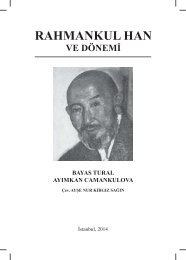THE SOVIET HISTORIOGRAPHY AND THE QUESTION OF KAZAKHSTAN’S HISTORY
SOVYET-TARIH-YAZICILIGI-ENG
SOVYET-TARIH-YAZICILIGI-ENG
Create successful ePaper yourself
Turn your PDF publications into a flip-book with our unique Google optimized e-Paper software.
<strong>THE</strong> <strong>QUESTION</strong> <strong>OF</strong> <strong>KAZAKHSTAN’S</strong> <strong>HISTORY</strong> 211<br />
family members of an arrested and exiled intellectuals shared the<br />
same fate with them. For example, when the prominent Kazakh poet<br />
Mağcan Cumabayev was arrested on 30 December 1937, his two elder<br />
brothers, along with his younger brother, were arrested as well. While<br />
his elder brothers were killed along with himself, his younger brother<br />
returned home only after working in labour camps for ten years under<br />
extremely harsh conditions. The exact date of their execution by<br />
shooting and the locations of their graves are unknown even today.<br />
Even though Mağcan was acquitted after his wife’s appeal in 1960, his<br />
works began to be printed only after 1989. That is, even a subsequent<br />
exoneration was not sufficient for your works’ publication. All facilities<br />
and resources were utilized in order to erase someone from society<br />
and historical memory. Therefore, even though it has been 25 years<br />
since the collapse of the USSR, the number of the works about Turkish<br />
World intellectuals killed under Stalin’s rule remains very small.<br />
One other common peculiarity of intellectuals murdered under<br />
Stalin rule was that most of them were arrested previously, before<br />
1937, and spent time in either labour camps or prisons. Returnees from<br />
labour camps and prisons had to endure tough days because the state<br />
labelled as “people’s enemy” and “anti-Soviet”. An intellectual so<br />
identified, lost his acquaintances. His relatives, friends, and neighbours<br />
stopped greeting him and distanced themselves from him. He lost his<br />
work and was forced to labour in most demoralizing and demeaning<br />
jobs. Life became unendurable and suicide frequently appeared as a<br />
way of liberation. Even his children were filled with hatred against<br />
him. The children of arrested or murdered people were admitted to<br />
the public foundling hospitals and subjected to intense propaganda<br />
there. The children being thus raised as young communists had no<br />
chance to approach with passion toward parents who were exposed<br />
as the “people’s enemy” and “anti-Soviet.” 400<br />
Arrested intellectuals’ homes experienced detailed and meticulous<br />
legal searches on the day of arrest or shortly thereafter and all written<br />
documents, books, and pictures were seized. These items were not<br />
returned, even if the arrest ended. In this way, their personal archive<br />
and most of their library perished along with their works. There is<br />
no information about returning the seized works of the scholars who<br />
focused on the intellectuals, statesmen, and laymen who were either<br />
400 Journalist and teacher Rukiye Devletkildi who had been arrested at the end of the<br />
World War II in Manchuria’s Mukden city on 20 September 1945 along with her spouse by<br />
KGB and sentenced to ten-year work in labour camps tells the story of her daughter who was<br />
born in the camp and was raised with hatred against her in her memoirs. Rokıya Devletkildi:<br />
Bir Tatar Hatınının Açı Yazmışı (edited by İsmail Türkoğlu), Kazan 2005.



